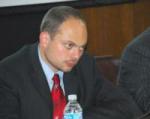Vladimir Kara-MurzaThe upcoming presidential election places Russia’s growing protest movement in a paradoxical position. On the one hand, pro-democracy forces have no candidate of their own: following the experience of 2008, when anti-Kremlin politicians were prevented from running, most opposition leaders declined to participate in the vote; Grigory Yavlinsky, the only liberal leader who did decide to run, has been barred from the ballot. On the other hand, the March vote presents the biggest electoral threat to Vladimir Putin in 12 years. All three of Russia’s national polling agencies—the government-owned VTsIOM, the government-friendly FOM, and the independent Levada Center—suggest that Putin will fall below the 50-percent-plus-one threshold required for a first round victory: they predict, respectively, that he would win 49 percent, 44 percent, and 43 percent of votes cast. And with a possibility of a unified anti-Putin protest vote, the outcome of the runoff is far from certain.
Faced with a seemingly impossible task—winning without a candidate—the Kremlin’s opponents decided to change the stakes. The protest leaders announced that they are prepared to give their backing to any of Putin’s handpicked opponents, as long as the candidate publicly agrees to a set of conditions—a “social contract” with the nation. The conditions, set in writing, include freeing political prisoners; liberalizing election laws and rules on party registration; dissolving the current Duma and holding new, competitive parliamentary elections; and limiting the president’s tenure to a maximum of two, four-year terms during his or her lifetime. The final and most important condition for the would-be president is to serve only for a “transitional period” needed to implement the reforms—12 to 18 months—and then resign and call new elections.
Hoping for an influx of millions of protest votes, three of Putin’s registered competitors (with the exception of nationalist Vladimir Zhirinovsky) have signaled their readiness to accept the conditions. Communist leader Gennady Zyuganov has promised to fulfill most of the demands, including the release of political prisoners, early parliamentary elections with liberalized rules for parties and candidates, and shorter presidential term limits. (Zyuganov’s newfound democratic rhetoric, however, did not stop him from laying a wreath at Stalin’s tomb). Crucially, the Communist chief does not seem eager on the notion of a “transitional presidency,” suggesting that he would like to move into the Kremlin for longer than 18 months. The same idea is proving problematic for billionaire Mikhail Prokhorov, who is only prepared to limit his presidency to four years. Other than that, Prokhorov’s electoral platform repeats many of the demands of the “Moscow Spring,” including limiting the president to two terms in office, allowing all political parties, and holding early parliamentary elections.
The candidate who came closest to accepting the “social contract” is Sergei Mironov, the former speaker of the upper house, until recently a close associate of Putin’s who has intensified anti-Kremlin rhetoric following his dismissal last year. Mironov has agreed to serve as a “transitional president” until December 2013, with a new presidential vote in March 2014. His plans include holding early parliamentary elections at the end of this year, with prior changes to the “unfair electoral legislation.” His manifesto calls, among other reforms, for a two-term limit on the presidency, easier rules for establishing political parties, and parliamentary (not presidential) appointment of the prime minister. Mironov’s own government would include Yavlinsky as minister for economic development, and anticorruption campaigner Alexei Navalny as head of the Audit Chamber—though also, bizarrely, nationalist firebrand Dmitri Rogozin (currently Putin’s deputy premier) as foreign minister, and Lieutenant General Vladimir Shamanov—who has been accused of war crimes in Chechnya—as minister of defense.
The presidential vote is four weeks away. The most immediate item on the opposition’s agenda is a rally this coming Saturday, when tens of thousands are expected to march through central Moscow to remind the regime that the movement for change that was born in the December protests is not going away. One of the main slogans at the rally will be: “Not a single vote to Putin.”
(From Vladimir Kara-Murza's blog, February 1, 2012)

